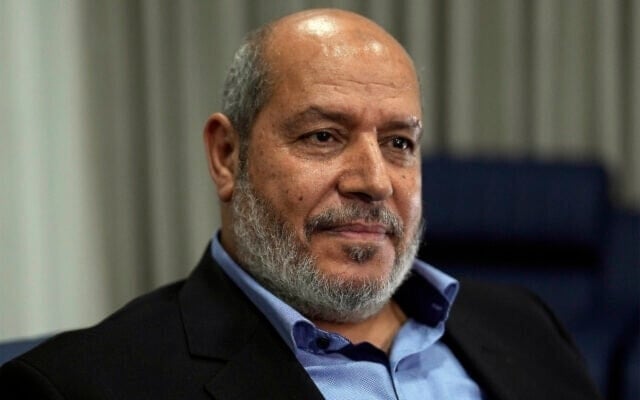Hamas, Turkey discuss Gaza ceasefire as Israeli violations persist
A Hamas delegation led by Khalil al-Hayya meets with Turkish intelligence chief İbrahim Kalin in Istanbul to discuss the implementation of the Gaza ceasefire agreement amid "Israel's" continued violations.
-

Senior Hamas leader Khalil al-Hayya during an interview in Istanbul, April 24, 2024. (AP)
A delegation from the leadership of the Islamic Resistance Movement, Hamas, headed by Khalil al-Hayya, met on Wednesday in Istanbul with the head of Turkish intelligence, Ibrahim Kalin, to discuss the latest developments related to the implementation of the Gaza ceasefire agreement and "Israel’s" ongoing violations of its terms.
The meeting comes at a time when regional and international diplomatic efforts intensify amid mounting concerns over "Israel's" repeated breaches of the US-brokered truce.
According to a statement issued by Hamas, the talks focused on the continued shelling and gunfire in areas under Israeli military control, the ongoing closure of border crossings, particularly the Rafah crossing, and restrictions on humanitarian and medical aid entering the Strip. The delegation also pointed to significant delays in rehabilitating critical infrastructure, including sewage systems, roads, and electricity grids, despite commitments laid out in the ceasefire framework.
Al-Hayya thanked Turkey for its "prominent role in reaching the ceasefire agreement," stressing the importance of Ankara’s continued political support and its backing of the Palestinian people as they confront the Israeli occupation across all Palestinian territories, especially in Gaza.
Unity framework
The Hamas official also briefed Kalin on the latest developments from the Cairo consultations held in late October, during which Palestinian factions agreed on a national unity framework and reaffirmed their commitment to fully implementing the ceasefire agreement.
The factions collectively rejected any attempts at annexation or demographic changes in Gaza, the West Bank, or al-Quds, and condemned the Israeli parliament’s preliminary approval of the "Sovereignty Application Law," which aims to impose Israeli law on large parts of the occupied West Bank.
Al-Hayya noted that the Cairo understandings included the withdrawal of Israeli forces from the Gaza Strip, the reopening of all crossings, and the transition into an early recovery phase leading to a comprehensive reconstruction process. The factions also agreed to establish a temporary Palestinian technocrat committee, composed of independent figures, to assume administrative responsibility in Gaza and coordinate public services with regional and international partners.
Ceasefire stability talks
The discussions follow a gathering of foreign ministers from several Muslim-majority countries in Istanbul on Monday, where Turkish officials highlighted the fragility of the ceasefire and renewed accusations that "Israel" was obstructing humanitarian relief. Turkish Foreign Minister Hakan Fidan announced that negotiations remain underway on a potential UN-mandated international stabilization force for Gaza, an idea supported by the United States but still lacking a formal mandate. He stressed that "Israel" must allow sufficient humanitarian aid into the Strip and that Palestinians should ultimately be responsible for their own governance once conditions allow.
Meanwhile, at the United Nations, Secretary-General António Guterres said on Tuesday that any international force proposed for "post-war Gaza" must operate under a UN mandate and that the transitional period should lead to the transfer of full administrative authority to the Palestinian Authority. The United States has circulated a draft resolution outlining a two-year deployment of an International Stabilization Force (ISF), which would include contributions from several Arab and Muslim-majority countries, though "Israel" strongly opposes Turkish participation.
As diplomatic discussions continue, Hamas and Palestinian factions warn that sustained Israeli violations and delays in implementing key ceasefire provisions threaten to unravel the truce. Both Turkey and the UN have urged greater international pressure to ensure compliance, accelerate reconstruction, and prevent a return to full-scale conflict.
Read more: Israeli prisons became like ‘another front’: Freed Palestinian author

 4 Min Read
4 Min Read









